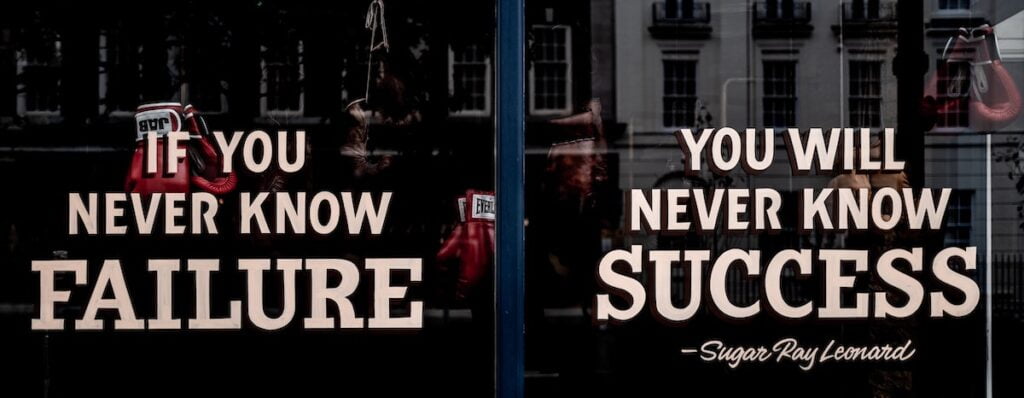Control fear of failure to maximise performance.
Managing our thoughts and emotions before a big rugby match can be as important as the weeks of physical training you’ve completed. Our emotions control the flow of hormones and how we react to them, so we need to train ourselves to react positively to extract the maximum performance benefit from our emotional responses so avoiding the negative effects of Fear of failure can transform your match day performance.

Embrace Fear
Firstly, fear and anger are legitimate and important emotional responses which trigger some of the most powerful physical reactions and are key to high performance if managed correctly. When we get scared our body primes itself to react by flooding the body with chemicals like adrenaline which speed up blood flow, reaction times and ready the muscles to either fight or run away. Pretty much the way that we want to be just before a big game!
Some people thrive on this reaction and become adrenaline junkies, which is the basis for roller coasters and extreme sports. We like the way we feel afterwards and are prepared to risk the fear of experiencing the afterglow!
Unfortunately, we don’t all like being scared so tend to avoid these emotions, meaning we’ve lost the ability to control and manage the response. But this is not natural, this is a learned behaviour, just watch kids playing on rocks at the beach or in the playground. They know it’s dangerous, but haven’t developed the fear of fear, so just do it anyway!
So how do we go back to being a kid again?
Feel the fear of failure
“Feel the fear and do it anyway”, “Just do it!”, the only thing we have to fear is fear itself. They make good taglines and titles, but at the core of these statements there is a fundamental truth, which is fear itself does not stop us from doing anything or make us anxious, it’s how we manage the reaction that is key.

Adrenaline is released when the body experiences stress or a threat and is responsible for the fight or flight mechanism. This is a good thing as it pushes more blood and oxygen to the muscles, which increases energy flow to the muscle fibres, giving you a surge of strength and speed. Just what we need!
However, too much adrenaline or the inability to burn off the effects lead to anxiety and is an uncomfortable experience, making us nervous. We don’t like feeling this way, which is why we tend to avoid stressful situations.
But the ideal scenario is to learn to control the effect, so we are less likely to avoid it. Mindfulness techniques are great for this as they teach you to experience and control your emotional reaction, reducing your fear of the fear!
Belly breathing is a good example for two reasons. Firstly, the best way to breathe is to use the diaphragm, not the rib cage to expand the lungs, as this increases the volume of oxygen in your lungs which reduces tension. Secondly, our bellies become tense when we are stressed, so stretching them out will reduce this tension, which will make you more comfortable and relax you more.
Reframe your expectations
Failure is relative. Ultimately, completing a triathlon is a success, it’s a tough sport you’ve done a lot of training, tried new things and are probably going to do a load of things over the next couple of hours that you have never done before. All your friends think you are mad for doing it because they think they can’t, but secretly they are impressed by the fact that you can. By definition, you are not a failure!
What people worry about is failing to achieve certain goals. What if I can’t hit my target tackles? What if I get pushed back in a ruck? What happens if it rains? What happens if I get injured? All of these are legitimate concerns, but they don’t constitute failure. Only failing to start because you’re scared of failing is a failure!

Reset your goals and expectations. Don’t think about whether you’ll finish in a given time, think about the experience and set achievable goals. You cannot control the outcomes, the weather may change, the ball might be slippery, it might be muddy on the pitch which slows you down, or the winds in the wrong direction making kicking difficult.
Focus on what is in your control, like your tackle technique or spacing , or little wins ( can I win this ruck). Not only are you unlikely to fail at these goals, but you’ll also find your self relaxing during the event because you’re focussing on the attacker rather than the fatigue in your quads!
The only goals of a rugby match are to have fun and have an experience to remember, everything else is secondary!
Don’t listen to yourself
Psychology is a deep and complex field and our emotional responses may have triggers which are unrelated to the experience at hand. Fear of failure is irrational. We know we can tackle, pass and kick. We’ve done it loads of times, but yet we fear failing to do it when it counts.
This is the key point. We are not scared of failing to win, we are just scared of failing at anything and this is caused by our feeling about ourselves, the inner dialogue that tells us we can’t do it. We need to look at that dialogue and consider what it’s telling you and how realistic that is. As the voice is in our heads we tend to believe it, so it becomes ingrained wisdom, but they are just our confidence and paranoia, and they lie to us.
However, these voices don’t know any more than we do, so we need to question these thinking traps in detail. If the voice says “those people know this is my first time” ask yourself how you know this? When did you start reading minds??
Another classic trigger of fear of failure is fortune telling. ” I know I am going to be knocked down by their big ball carrier, she’s much bigger than me!!”.
Since when did you start seeing into the future? I bet you can’t tell me next week’s lottery numbers!
Thinking traps are illogical and have no basis in truth but are at the root of your fear of failure. You can reduce their effectiveness by catching yourself and questioning what they are telling you before they trigger an emotional reaction.
Look at your story
If you have the confidence to explore your story you can work out what is really at the basis of your fear of failure because it’s not a natural feeling, its learned behaviour. Something in your background or experience tells you that failure has to be avoided at all costs because the consequences are so high.
This could have been the way that we were brought up, the constant pressure of exams and academic performance that places anything else than an A as a failure or the performance-based culture of modern work practices, which set stretch goals and tends to punish failure rather than rewarding growth. Many of the goals we set are arbitrary and relative. If we grow by 5% rather than 6%, have we really failed?

Whatever it is, understanding the impact that it has on your self-belief and emotional construct can allow you to question the validity of your assumptions and make you realise that there is no such thing as success or failure, only experiences and outcomes. You can control the experiences, but the outcomes will look after themselves
Control your fear of failure and focus on the fun!
Let’s be honest, unless we’re pro’s, whether we win or lose a match doesn’t really matter, it’s the experience and enjoyment that counts, and if you open yourself up to enjoying the experience, not only will you get more out of the sport, chances are you’ll perform better too!

